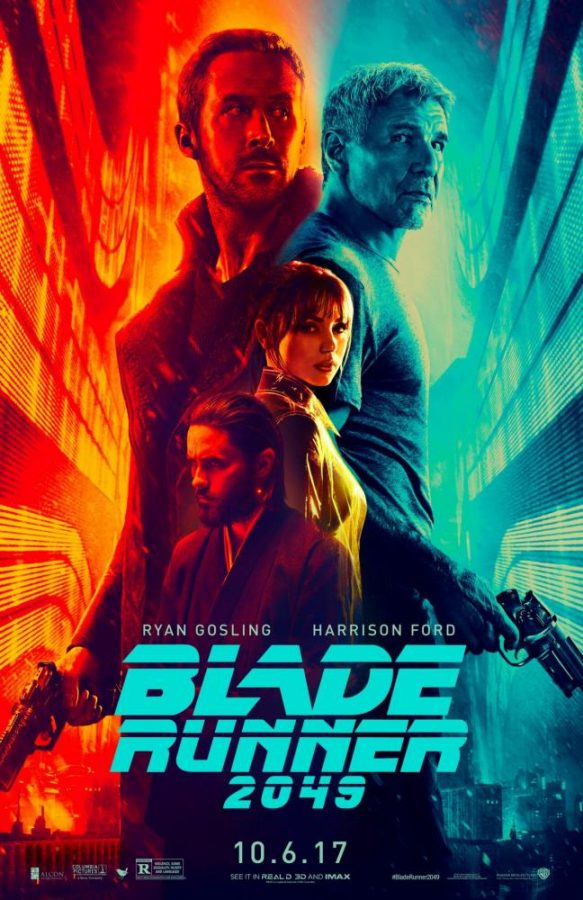Blade Runner 2049 Review
October 12, 2017

I’m not a film critic. Whenever I watch a movie, I always go in with high hopes and usually come out with good feelings. Unlike many film analyzers (emphasis on the former syllable), I genuinely like and love most movies. I’m liberal with the amount I’ll suspend my disbelief and I place an immense amount of weight on a movie’s simple entertainment factor. I know the “Fast and Furious” movies are terrible but if you wouldn’t sign up to see Transporter and the Rock throw down in prison, then now might be as good of a time as any to remove the stick. I’ll watch old, new, big budget, small budget, arthouse, domestic and foreign films. It is my belief that just about every film has something to appreciate and admire. I just love movies.
That said, thus cannot be the case if you attach two words as grand in scale as “Blade” and “Runner” to the title. In my mind, doing that in 2017 is like naming your firstborn son Leonidas; he’s going to have to be pretty great.
“Blade Runner”, in my mind, is nothing shy of a masterpiece. It’s a relatively linear plot with serious thematic underpinnings. The protagonist, Rick Deckard (Harrison Ford), is a “Blade Runner”, a special police officer tasked with “retiring” (a sadistic synonym for execution) bad guy humanoids known as replicants. The replicants, described as “more human than human” give him doubt about what defines a person and, by extension, the ethicality of the life he lives. It’s a twist of the classic noir archetype made popular by famous films of yesteryear such as 1946’s “The Big Sleep”.
Vangelis’s soundtrack is arguably its own character in the film. It’s dark, spooky and mechanical while somehow feeling organic, alive and full of personality, which, in a way, describes the driving ethos of the film itself.
From the start of the movie, the viewer is immersed into Ridley Scott’s intricately crafted surrealist dreamscape of a setting. Smoke and torrential downpour create drama. The out-there architecture and fashion hooks the eye and mind. Upper class areas can be characterized by a warm tone, cleanliness and a predominantly Caucasian population while lower class areas are steely, crime-ridden, grimy and multicultural. It is also worth noting that CGI was not used in the production of this film. Buildings were either constructed in full or as a miniature. Taking this into consideration, Scott’s world, though groundbreaking and jaw dropping to behold, never strays too far from our own reality.
My hopes and expectations regarding its sequel were set very high. But with a new crew (Denis Villeneuve replacing Ridley Scott, Jóhann Jóhannsson, Benjamin Wallfisch and Hans Zimmer replacing Vangelis and Ryan Gosling replacing Harrison Ford), I was met with a fair amount of skepticism.
And then there’s the problem with sequels themselves. Sequels… Sequels are like any other movie; they’re either a benefit or a hazard. If they’re a benefit it’s not my problem.
When made available, the lowest hanging fruit will almost always be the one to grab, especially when tens of millions of dollars are at stake. The issue with that mentality, however, is a tenuous result which lacks originality of any sort. This is the truth with most sequels. Put simply, the biggest flaw with them is this: Playing it safe.
I’ll give you an example. In the past decade, the Marvel Cinematic Universe has gone down a storm. To their credit, the Marvel guys know what they’re doing and have been successful at it. About two movies per year have dropped over that period of time and the money keeps on rolling in. This certainly isn’t the case with DC’s cinematic universe.
The serial, then, is not an easy thing to produce well, but even Marvel movies suffer from the fatal flaw. When watching the latest Thor or Iron Man movie, there’s a voice in the back of my head that constantly reminds me of how much money they’re milking from the formula. The formula simply doesn’t allow for innovative storytelling or killing off main characters. If nothing is allowed to stop the studios from making money, then there is no risk. Without risk, there is no reward. Contrary to box office numbers, movie-goers notice this lack of consequences in multi-movie goliaths. That’s why movies like “Logan” and “Deadpool” were so popular. They broke the mold.
Generally speaking, when sequels are good, they’re fun cookie-cutter entertainment that leaves us just shy of content. When they’re bad, however, they’re sad, tragic desperate piles of shit which pander only to the simple minded who focus purely on the surface level aspects of its predecessors. I digress…
“Blade Runner 2049” opens in much the same way as the first, with a prologue text and an all seeing eye. Officer K (Ryan Gosling) is a replicant of a newer generation who works as a Blade Runner, bearing many similarities to the original’s Deckard: slick, skilled, carrying enough self-loathe to fill a barrel and donning a dope jacket.
After seeing Officer K hold his own in a fistfight with replicant, Sapper Morton (Dave Bautista), my skepticism only grew. It was a cool scene, don’t get me wrong, but with a new model replicant as the film’s protagonist, the aspect of vulnerability from the first seemed to have been lost. Entering the second act, however, my skepticism was crushed. Crushed—by utter bewilderment. I understood what had been achieved. This is no simple expansion. It’s an evolution.
“2049”’s visuals are grander, but that was to be expected. “2049”’s action scenes are smooth and put me at the edge of my seat, but that was to be expected. The way “2049” took deep philosophical thematic elements from the first and twisted them with such grace and subtlety just as the first did to the noir genre? I certainly couldn’t have predicted that. Where the first responds to the question of “what makes a human human?” with the possible answers of love, lifespan and emotional affection, the sequel goes deeper, both by expanding the concept of love (a scene in the film reminiscent of 2013’s “Her” involving AI and a sex worker left me speechless), as well as live birth. The sequel masterfully introduces new heady concepts while strategically disregarding others.
“2049” is a complex, intrinsic, drop dead gorgeous addition to the world of “Blade Runner” and praise can go no higher than that. It is my belief that “2049” will remain isolated from the majority of modern sequels and reboots as they are left to be forgotten… like tears in the rain.


